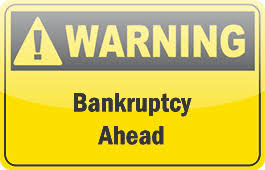 Filing for bankruptcy isn’t always the most pleasant subject to talk about. However, you might find yourself thinking about this as one of your financial options.
Filing for bankruptcy isn’t always the most pleasant subject to talk about. However, you might find yourself thinking about this as one of your financial options.
Is it the right time to file for bankruptcy? Which bankruptcy type is best for you?
In this article, we’ll try to answer these questions and help you decide when to file for bankruptcy.
What is Bankruptcy?
Filing for bankruptcy is a legal undertaking where, if you cannot repay debts, you seek relief from some or most of your obligations. Most bankruptcies run on court orders.
You may think of it as a chance for a fresh start, though most people would attach many negative emotions to it. The key is to ensure that you get the best advice before you file for bankruptcy. A good lawyer is often a good starting point. Consider contacting a firm similar to this bankruptcy lawyer Harrisburg PA to help you get started. Below is some important information to understand relating to filing for bankruptcy.
Types of Bankruptcies
Different types of bankruptcies exist. The three most commonly used types are:
- Chapter 7
- Chapter 11
- Chapter 13
Chapter 7 Bankruptcy
Chapter 7 is the most straightforward type of bankruptcy. It’s what most individuals file when they need liquidation.
A trustee the court chooses will sell some of your property and use the proceeds to partially repay your debts. After that, all your other debts are discharged.
Chapter 11 Bankruptcy
Chapter 11 is mainly for businesses, and it’s the most complex type of bankruptcy. It involves the reorganization of the debtor’s business, debts, and assets.
Often, the company remains open and operating. Notable examples of corporations who have filed Chapter 11 bankruptcies and stayed running include:
- K-mart
- United Airlines
- General Motors
- Marvel Entertainment
Chapter 13 Bankruptcy
Chapter 13 is where you submit a plan to the court to repay your debts from three to five years. Your debts will also be partially discharged.
Since you don’t need to liquidate assets, you get to keep them as long as you follow the repayment plan.
When to File for Bankruptcy
You need to consider your situation thoroughly before you choose any of these bankruptcy choices. If you decide to proceed, I would recommend hiring professionals local to your area in order to ensure that everything is done correctly. For example, search “Bankruptcy Attorney Milwaukee” if you are based in that city to find a local representative. In addition to legal help, here are some important considerations to think about.
Here are some important considerations to think about.
Liabilities vs. Assets
If your liabilities far exceed your assets, you’re likely just servicing the debt. You make the necessary monthly payment while your income cannot cover your debts.
If you’re in this situation, you should seriously consider filing for bankruptcy.
Credit Counseling
A consumer credit counselor may often be successful in negotiating with your creditors. Under Chapter 7, you need to undergo six months of credit counseling before you can file for bankruptcy.
If you have tried this and it doesn’t work, consider your bankruptcy options.
Depleted Savings
Filing for bankruptcy requires you to list all your assets. You can save some of your assets, but your general savings will have to go.
If you have depleted savings and can’t cover your debts, consider which type of bankruptcy is best for your situation.
Garnished Wages
If your creditors and lenders sue you, your wages may be garnished — they may be withheld to pay for your debts.
To get some if not all of your money back from garnishment, consider filing for the right type of bankruptcy.
Legal Actions
Being sued by lenders and creditors is an obvious sign that you need to consider bankruptcy.
If you received any summons because of a lawsuit, contact your attorney right away. Heed the summons to avoid any default judgment against you.
If you file for bankruptcy, you can avoid such judgment.
Effects of Bankruptcy
Although it’s most likely a correct decision in tough situations, filing for bankruptcy also has negative effects, which are why many people find it unpleasant.
- Your credit score will take a major hit.
- You may lose your properties.
- Your mental health may suffer.
And others.
Still, it can be a wise solution if you know which type to file and how to rebuild yourself from there. You can gradually move forward again if you take the right steps.

No Comments